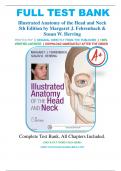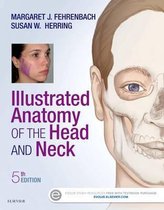FULL TEST BANK
Illustrated Anatomy of the Head and Neck
5th Edition by Margaret J. Fehrenbach &
Susan W. Herring
PRINTED PDF | ORIGINAL DIRECTLY FROM THE PUBLISHER | 100%
VERIFIED ANSWERS | DOWNLOAD IMMEDIATELY AFTER THE ORDER
Complete Test Bank, All Chapters Included.
CHECK OUT MORE FILES HERE:
MEDCONNOISSEURLIBRARIES.COM
, dfghnjmhgfdsdfghjhgfddfghjkytrertyuijhbvhjhgfdfghjjytrtyu
Chapter 01: Introduction to Head and Neck Anatomy
MULTIPLE CHOICE
1. Which surface of the body is visualized by the clinician when performing an extraoral
examination of the patient’s eyes?
a. Anterior
b. Posterior
c. Superior
d. Lateral
ANS: A
Feedback
A The patient’s eyes are visualized on the anterior surface of the patient’s body.
B The patient’s eyes would NOT be easily visualized on the posterior of the
patient’s body.
C The patient’s eyes would NOT be easily visualized on the superior surface of the
patient’s body.
D The patient’s eyes would NOT be easily visualized on the lateral surface of the
patient’s body.
DIF: Comprehension REF: p. 3 OBJ: 2
TOP: CDA: General Chairside, I. B. Preliminary Physical Examination
MSC: NBDHE, Scientific Basis for Dental Hygiene Practice, 1.1.1 Head and Neck Anatomy
2. Which of the following is CORRECT concerning the sagittal plane of the body?
a. Parallel to the median plane
b. Parallel to the frontal plane
c. Parallel to the horizontal plane
d. Parallel to the coronal plane
ANS: A
Feedback
A A sagittal plane is parallel to the median plane.
B A sagittal plane is NOT parallel to the frontal plane but perpendicular.
C A horizontal plane is perpendicular to the median plane. A sagittal plane is
parallel to the median plane. Thus a horizontal plane is perpendicular to a
sagittal plane.
D A sagittal plane is NOT parallel to the coronal plane but perpendicular.
DIF: Recall REF: p. 3 OBJ: 1
TOP: CDA: General Chairside, I. A. Demonstrate understanding of basic oral and dental anatomy,
physiology, and development
MSC: NBDHE, Scientific Basis for Dental Hygiene Practice, 1.1 Anatomy
3. When a patient is in anatomic position, what is the surface of the palms of the hand
considered?
a. Anterior
b. Lateral
c. Medial
asdfgfdsdrtgyhuytrertyuigftyuijhgvghjkkjhgfdfyuhgfrty
, dfghnjmhgfdsdfghjhgfddfghjkytrertyuijhbvhjhgfdfghjjytrtyu
d. Posterior
ANS: A
Feedback
A The palms of the hands in anatomic position are facing toward the front and are
anterior (or ventral).
B The palms of the hands in anatomic position are NOT facing lateral or away
from the median plane but are facing toward the front and are anterior (or
ventral).
C The palms of the hands in anatomic position are NOT facing medial or toward
the median plane but are facing toward the front and are anterior (or ventral).
D The palms of the hands in anatomic position are NOT facing toward the
posterior or back of the body but are facing toward the front and are anterior (or
ventral).
DIF: Recall REF: p. 3 OBJ: 2
TOP: CDA: General Chairside, I. B. Preliminary Physical Examination
MSC: NBDHE, Provision of Clinical Dental Hygiene Services, 1.0 Assessing Patient Characteristics
4. What is the anatomic relationship of the right arm to the left leg?
a. Sagittal
b. Contralateral
c. Ipsilateral
d. Midsagittal
ANS: B
Feedback
A The two legs are contralateral to each other. Sagittal describes a plane of division
of the body created by an imaginary plane parallel to the median plane.
B Contralateral structures are located on the opposite side of the body, which is the
anatomic relationship of the right arm to the left leg.
C Ipsilateral refers to structures on the same side of the body; in contrast, the two
legs are contralateral to each other and thus are located on the opposite side of
the body.
D The two legs are contralateral to each other. Midsagittal describes a plane that
divides the body into right and left halves.
DIF: Comprehension REF: p. 3 OBJ: 2
TOP: CDA: General Chairside, I. A. Demonstrate understanding of basic oral and dental anatomy,
physiology, and development
MSC: NBDHE, Scientific Basis for Dental Hygiene Practice, 1.1 Anatomy
5. What is the anatomic relationship of the muscles to the skin?
a. Anterior
b. External
c. Deep
d. Superficial
ANS: C
asdfgfdsdrtgyhuytrertyuigftyuijhgvghjkkjhgfdfyuhgfrty
, dfghnjmhgfdsdfghjhgfddfghjkytrertyuijhbvhjhgfdfghjjytrtyu
Feedback
A Muscles are deep to the skin.
B Muscles are deep to the skin.
C Muscles are located inward, away from the body surface, deep to the skin.
D Muscles are deep to the skin.
DIF: Comprehension REF: p. 3 OBJ: 2
TOP: CDA: General Chairside, I. A. Demonstrate understanding of basic oral and dental anatomy,
physiology, and development
MSC: NBDHE, Scientific Basis for Dental Hygiene Practice, 1.1 Anatomy
6. What is the anatomic relationship of the shoulders to the hips?
a. Deep
b. Medial
c. Inferior
d. Superior
ANS: D
Feedback
A The shoulders are superior to the hips.
B The shoulders are superior to the hips.
C The shoulders are superior to the hips.
D The shoulders are superior to or closer to the head than the hips.
DIF: Comprehension REF: p. 3 OBJ: 2
TOP: CDA: General Chairside, I. A. Demonstrate understanding of basic oral and dental anatomy,
physiology, and development
MSC: NBDHE, Scientific Basis for Dental Hygiene Practice, 1.1 Anatomy
7. Which of the following is meant by the term “ventral”?
a. Back of an area of the body
b. Front of an area of the body
c. Inner side of an area of the body
d. Outer side of an area of the body
ANS: B
Feedback
A The back of an area of the body is referred to as the posterior surface.
B The front of an area of the body is referred to as the ventral surface.
C The inner side of an area of the body, away from the body surface, is referred to
as deep.
D The outside of an area of the body, toward the surface, is referred to as
superficial.
DIF: Recall REF: p. 3 OBJ: 1
TOP: CDA: General Chairside, I. A. Demonstrate understanding of basic oral and dental anatomy,
physiology, and development
MSC: NBDHE, Scientific Basis for Dental Hygiene Practice, 1.1 Anatomy
8. Which of the following describes a patient’s eyes when they are in anatomic position?
asdfgfdsdrtgyhuytrertyuigftyuijhgvghjkkjhgfdfyuhgfrty





